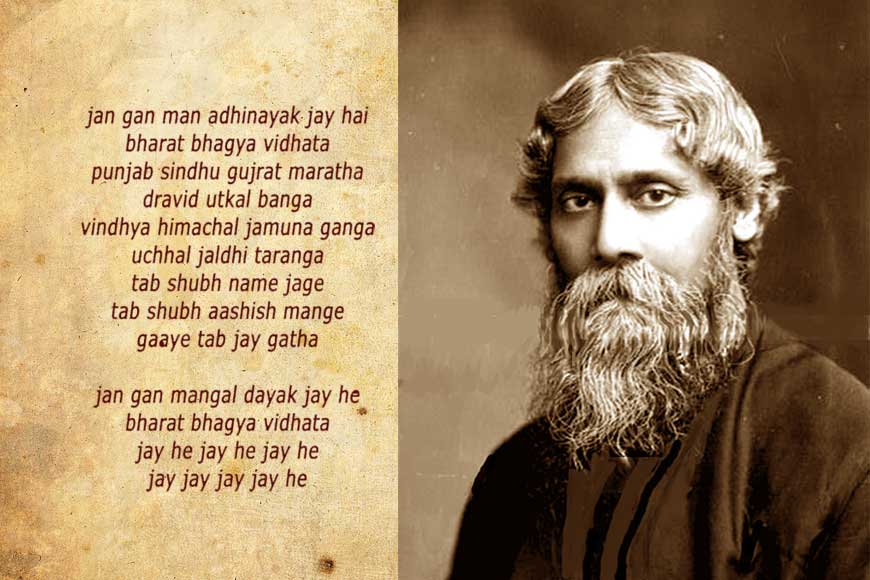Did Tagore compose Jana Gana Mana in praise of King George V?

OWhen was India’s National Anthem first sung in British India? Rabindranath Tagore’s poem/song “Jana Gana Mana Adhinayaka” was sung publicly at the 26th annual national convention of Indian National Congress, held in Calcutta between December 26 and 28, 1911. The song became mired in controversy thereafter and there was a section who alleged the song was composed for a durbar in Delhi in praise of British King George V. This controversy keeps on resurfacing, even today after a century!
The song’s original manuscript is missing and no written records have been found so far to establish the date or year when it was penned. Dinendranath (Rabindranath’s grandson) was a brilliant musician who set the tune for the song. It was rehearsed several times at Nilratan Sen’s house on Harrison Road before it was performed publicly for the first time on December 27 at the convention. Days after the programme, detailed reports about the convention were published in the Anglo-Indian press and the confusion about the song was stirred up by the ineptness of the pro-British Anglo-Indian press. The Englishman (December 28, 1911) wrote, “The proceedings began with the singing by Rabindranath Tagore of a song specially composed by him in honour of the Emperor.”
In 1937, Netaji Subhash Chandra Bose first proposed to make ‘Jana Gana Mana’ the country’s national anthem. He finalized the song as national anthem while he was in Germany. On the occasion of the founding meeting of the German-Indian Society on 11 September 1942 in the Hotel Atlantic in Hamburg, Jana Gana Mana was played for the first time by the Hamburg Radio Symphony Orchestra as the national anthem of an independent India.
The Statesman (December 28, 1911) wrote, "The Bengali poet Rabindranath Tagore sang a song composed by him specially to welcome the Emperor."
The Indian (December 29, 1911) wrote: “When the proceedings of the Indian National Congress began on Wednesday 27th December 1911, a Bengali song in welcome of the Emperor was sung. A resolution welcoming the Emperor and Empress was also adopted unanimously."
Delhi University's Pradip Kumar Dutta blames these reports for the confusion that persists till this day. “The reports were based on understandable ignorance since the Anglo-Indian press had neither the linguistic abilities nor the interest to be accurate. Actually, two songs were sung that day – ‘Jana Gana Mana’ had been followed by a Hindi song composed specially for George V by Rambhuj Chaudhary. There was no real connection between the composition of Jana Gana Mana and George V, except that the song was sung -- not written - at an event which also felicitated the king.”
The truth was finally nailed by a letter Tagore wrote to Pulin Behari Sen in November 1937. The poet said it was obvious that "neither the Fifth nor the Sixth nor any George could be the maker of human destiny through the ages….he had hailed in the song Jana Gana Mana that Dispenser of India's destiny who guides, through all rise and fall, the wayfarers, He who shows the people the way..." Clearly, Tagore did not write the poem either for the British king or the Congress.
The song was largely unknown except to the readers of the Adi Brahmo Samaj journal, Tattwabodhini Patrika. The poem was published in January 1912, under the title Bharat Bhagya Bidhata in the magazine. Around 1918-1919, Margaret Cousins (an expert in European music and wife of Irish poet James Cousins, then vice-principal of Besant Theosophical College, set down the notation to the national anthem in the college. The translated version and the notation are framed and preserved in the college at Madanapalle.
In 1937, Netaji Subhash Chandra Bose first proposed to make ‘Jana Gana Mana’ the country’s national anthem. He finalized the song as national anthem while he was in Germany. On the occasion of the founding meeting of the German-Indian Society on 11 September 1942 in the Hotel Atlantic in Hamburg, Jana Gana Mana was played for the first time by the Hamburg Radio Symphony Orchestra as the national anthem of an independent India. With the help of the budding poet from Layalpur, Hussain and Anandmay Sahay, Secretary of Azad Hind Government, Bose translated the song into Hindi. The translated version of the song became very popular both in Japan and Germany.
The song’s original manuscript is missing and no written records have been found so far to establish the date or year when it was penned. Dinendranath (Rabindranath’s grandson) was a brilliant musician who set the tune for the song. It was rehearsed several times at Nilratan Sen’s house on Harrison Road before it was performed publicly for the first time on December 27 at the convention. Days after the programme, detailed reports about the convention were published in the Anglo-Indian press and the confusion about the song was stirred up by the ineptness of the pro-British Anglo-Indian press.
After Independence, Tagore’s ‘Jana Gana Mana’ was adopted by the Constituent Assembly as the National Anthem on 24 January 1950. But detractors of Tagore never stopped short of alleging the song was “composed and sung as an act of sycophancy" to George V, the only British king-emperor to travel to India. They propagated the song was a glowing testimonial to the British rulers by Tagore.
The truth was finally nailed by a letter Tagore wrote to Pulin Behari Sen in November 1937. The poet said it was obvious that "neither the Fifth nor the Sixth nor any George could be the maker of human destiny through the ages….he had hailed in the song Jana Gana Mana that Dispenser of India's destiny who guides, through all rise and fall, the wayfarers, He who shows the people the way..." Clearly, Tagore did not write the poem either for the British king or the Congress. "It was a hymn to his Maker, the guardian of the country's destiny," something which many willfully ignore or forget.











